10 Best AI Tools for Scientific Writing (Free + Paid): AI for Your Next Research Paper (2026)
Scientists today are facing bigger challenges than ever before. With millions of research papers being published yearly and the pressure to produce high-quality scientific writing, AI tools have become essential for researchers and academics. We've put together a list of the top 10 AI tools that are transforming scientific writing in 2026.
These tools can help you with everything from organizing research papers to generating clear, well-structured content, and even turning complex papers into easy-to-understand summaries.
Let's get into it and find the best AI tool for scientific writing to suit your workflow.
Best AI Tools for Scientific Writing at a Glance
Elephas: Best for Mac users seeking a comprehensive personal knowledge management system with AI-powered writing assistance.
Consensus: Best for researchers needing quick, AI-driven insights from a massive database of over 200 million scientific papers.
Claude: Best for generating high-quality, well-structured scientific content with advanced language understanding.
YomuAI: Best for students looking to overcome writer's block and improve academic writing with AI-generated suggestions.
ResearchRabbit: Best for researchers wanting an intuitive, visual way to map and explore academic literature connections.
GoogleScholar: Best for finding and accessing a wide range of scholarly resources with easy citation management.
Wordvice.ai: Best for real-time writing improvement, tone detection, and academic writing refinement.
Zotero: Best for researchers needing a comprehensive reference management and source collection tool.
JenniAI: Best for basic writing assistance, though with some limitations in consistency.
Jotlify: Best for transforming complex research papers into accessible summaries and audio content.
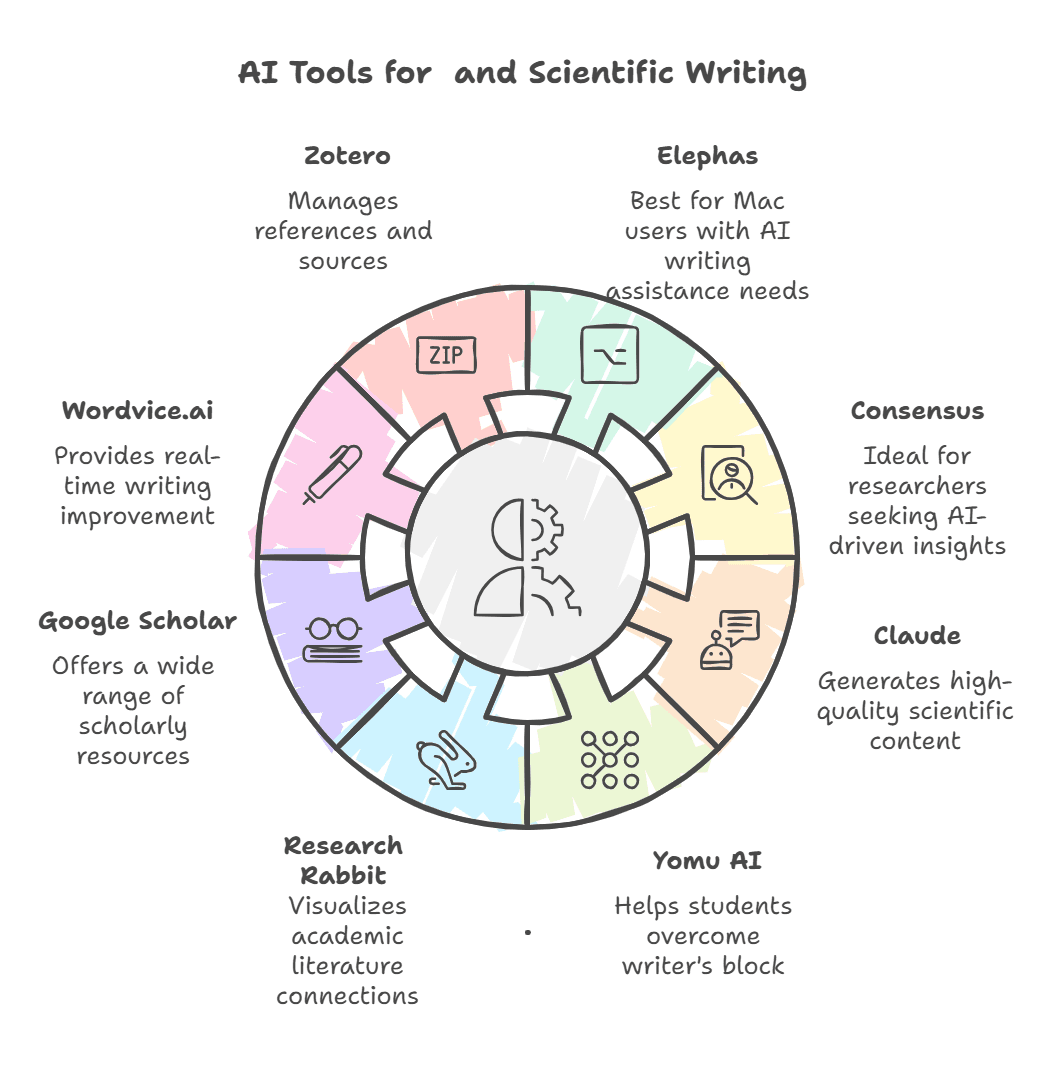
1.Elephas
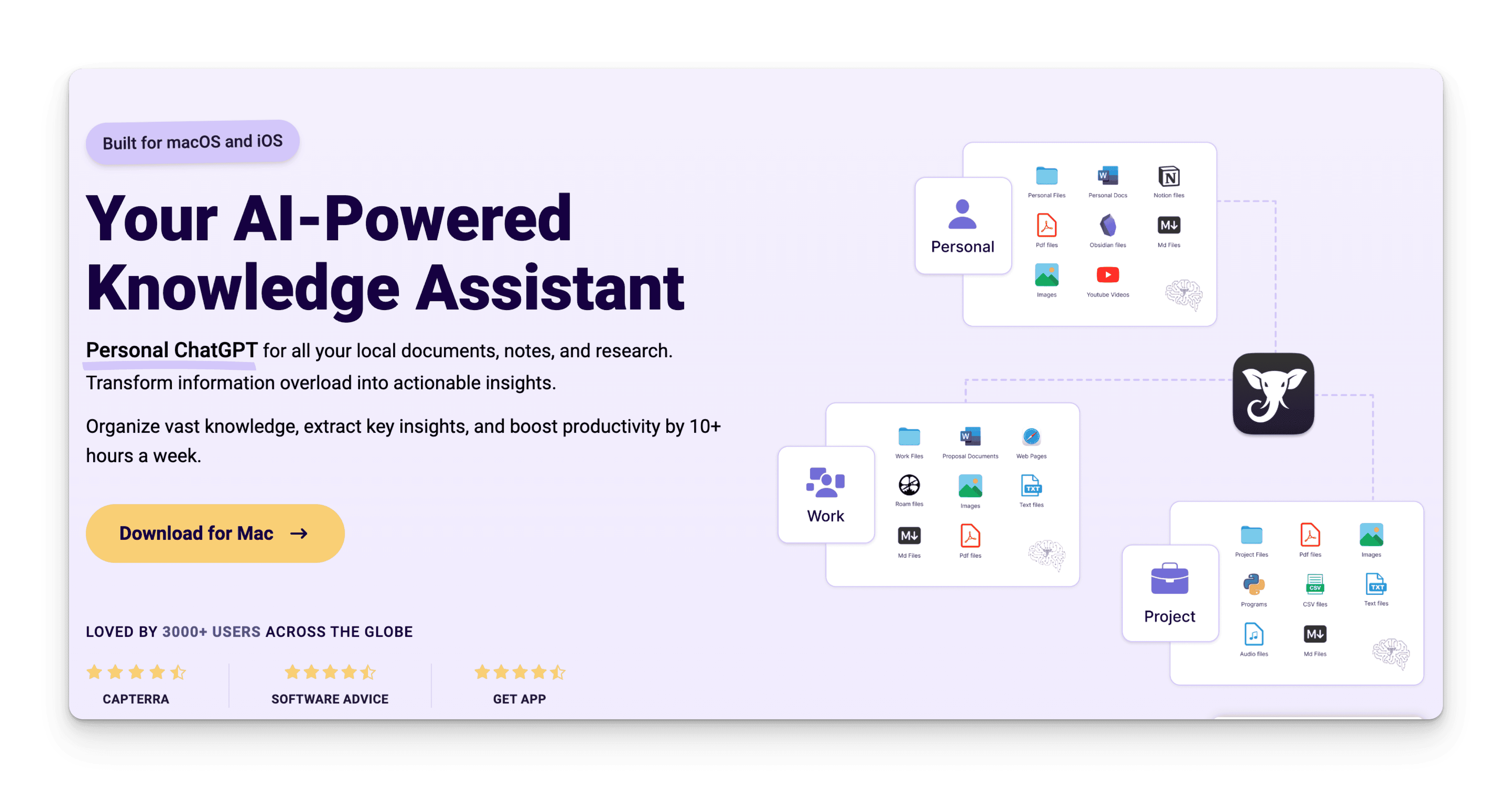
Elephas is a powerful knowledge management tool designed for Mac users who want to organize and access information easily. It helps people capture insights from different sources and create a personal knowledge base right on their computer, making information gathering and research more efficient.
The tool offers unique features like Super Brain, which allows users to collect and integrate content from various sources seamlessly. With multiple AI models and offline capabilities, Elephas transforms how people work with information, making research and writing more streamlined and intelligent.
Pros:
Researchers can compile and organize research papers, notes, and data from multiple sources into a single, searchable knowledge base
Supports local embeddings, allowing scientists to work with sensitive research data completely offline without risking data privacy
Provides grammar fixes and smart writing features to help scientists communicate their research more clearly and professionally
Allows adding web pages and YouTube links to research repositories, creating a comprehensive multimedia research archive
Enables content repurposing, helping scientists transform research papers into conference presentations.
Cons:
Primarily designed for Mac users
Might be overwhelming for users who prefer simpler tools
Pricing: $8.99/month
2. Consensus
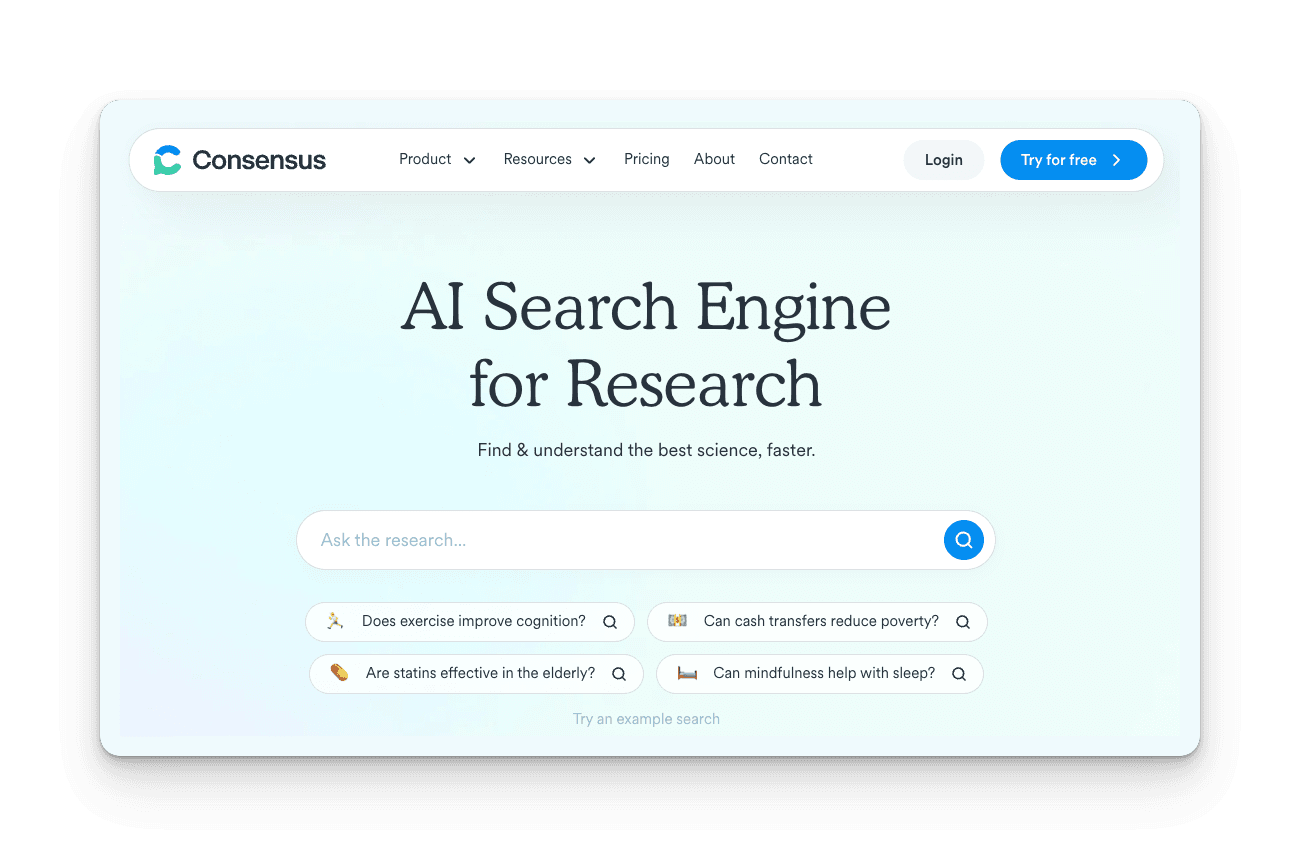
Consensus is an innovative search tool that helps researchers, students, and professionals find and understand the most relevant scientific papers quickly and efficiently. By leveraging advanced language models and proprietary search algorithms, Consensus streamlines the research process and makes complex scientific knowledge more accessible.
One of the standout features of Consensus is its extensive research coverage, with over 200 million papers across various scientific and academic domains. The platform's AI-driven insights, such as the Pro Analysis and Consensus Meter, provide users with valuable context and direction, enabling them to grasp key concepts and identify the most pertinent studies faster.
Pros:
A comprehensive database of over 200 million research papers
Time-saving AI insights, including topic summaries and consensus indicators
Advanced search filters for refined results (e.g., sample size, study design, open access)
Study the Snapshot feature for a quick overview of key information
Direct links to original research papers for further exploration
Cons:
Some AI-generated insights may require additional verification, especially for niche or emerging topics
Certain complex or open-ended questions may not yield optimal results
Pricing: $8.99/month
3. Claude
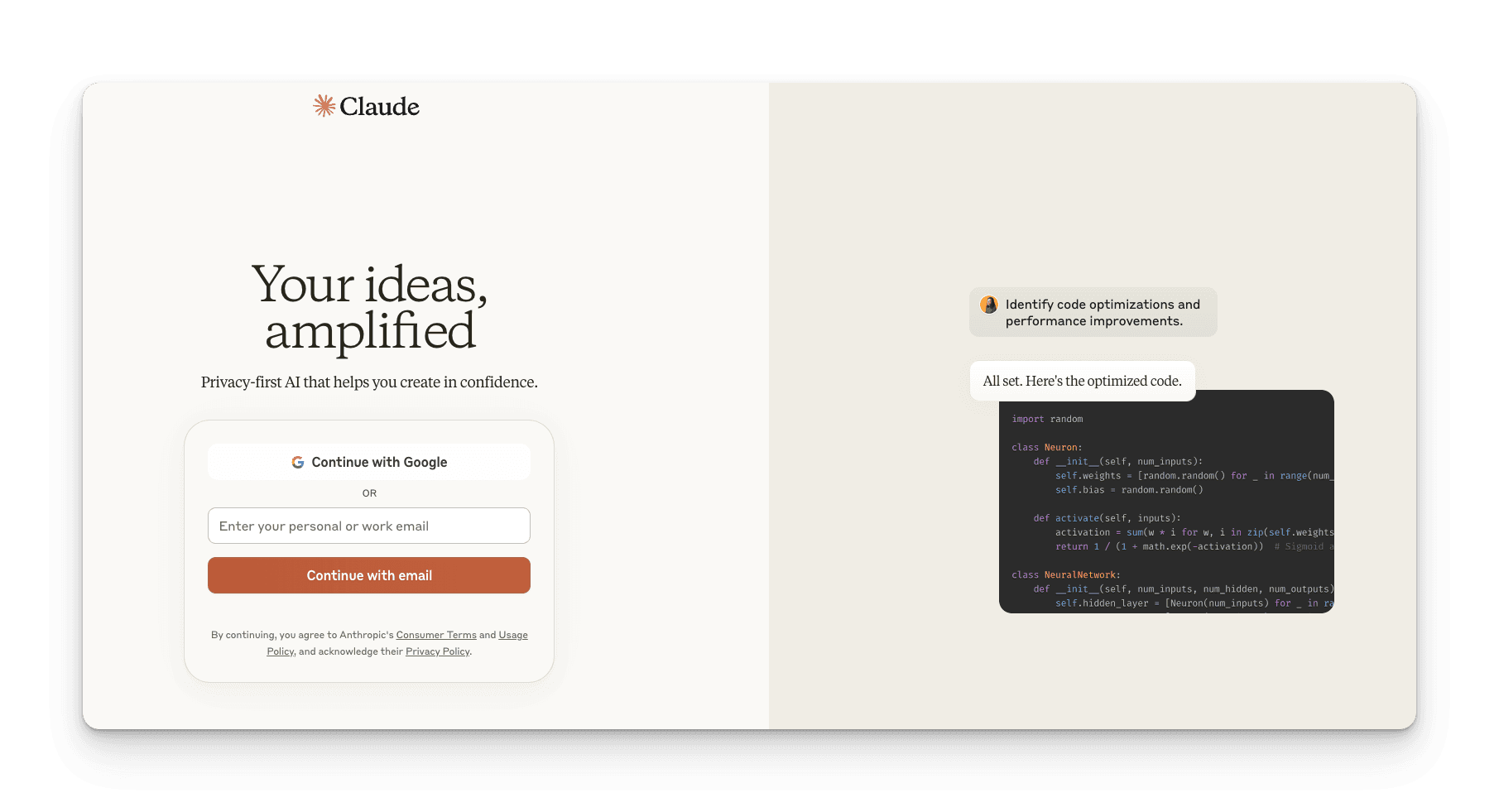
Claude is a LLM like ChatGPT that has gained significant attention in the scientific community for its potential to revolutionize the way researchers approach writing. Developed by Anthropic, Claude has advanced natural language processing capabilities and a deep understanding of scientific concepts, making it an invaluable tool for academics and researchers alike.
One of Claude's standout features is its ability to generate high-quality, well-structured content that adheres to the rigorous standards of scientific writing. By leveraging its vast knowledge base and sophisticated algorithms, Claude can assist researchers in crafting clear, concise, and coherent manuscripts, saving them countless hours of editing and revision.
Pros:
Generates content that follows the conventions of scientific writing, including proper citation formatting and use of technical terminology
Assists in organizing ideas and structuring papers, ensuring logical flow and cohesion
Provides suggestions for improving clarity, concision, and readability
Offers best practices and ideas based on the scientific writing domain
Integrates seamlessly with popular word processing and reference management tools
Cons:
May struggle with highly specialized or niche topics that require extensive domain expertise
Generated content should always be reviewed and edited by human experts to ensure accuracy and compliance with field-specific guidelines
Pricing: $20/month
4. Yomu AI
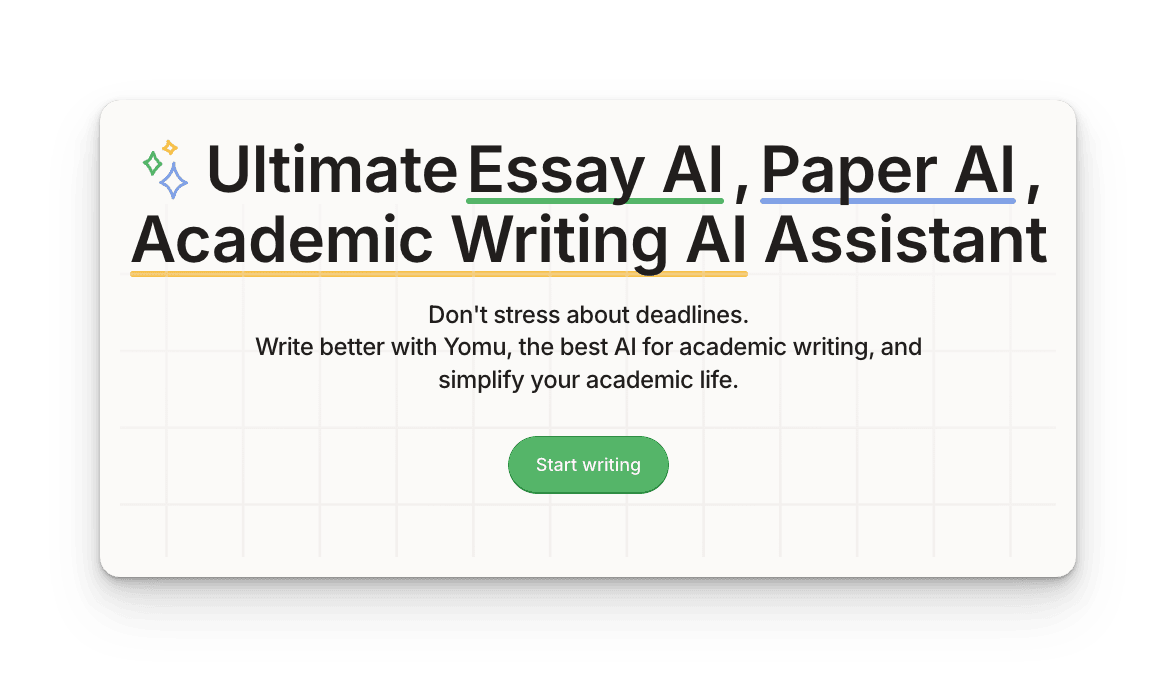
Yomu AI is an innovative writing tool that helps students craft better essays, research papers, and academic assignments. By offering a range of features cusomized to the needs of students, Yomu AI aims to simplify the writing process and improve the quality of academic work.
One of the standout features of Yomu AI is its ability to generate ideas and suggestions for your writing. When faced with writer's block or difficulty developing a topic, Yomu AI can provide inspiration and help you brainstorm ideas to get started.
Pros:
Generates ideas and suggestions to overcome writer's block
Helps develop ideas into well-structured sentences and paragraphs
Assists in finding relevant citations and sources to support arguments
Offers plagiarism checking to maintain academic integrity
Continuously updated with new features based on user needs
Cons:
Still under development, so some features may be limited or not yet available
May not be suitable for all types of academic writing or subject areas
Generated suggestions may require editing to fully align with the user's intended message
Pricing: $9/month
5. Research Rabbit

ResearchRabbit is an innovative research mapping tool that streamlines the process of discovering and organizing relevant research papers. By leveraging the Microsoft Academic Graph (MAG) database, ResearchRabbit offers a user-friendly interface and powerful features to help researchers navigate the complex landscape of academic literature.
One of the standout features of ResearchRabbit is its intuitive column-based interface, which allows users to effortlessly explore related papers, references, and citations. Starting with a collection of seed papers, researchers can quickly expand their literature map by clicking on relevant papers, authors, or keywords.
Pros:
Intuitive and user-friendly interface with a novel column-based design
Fast generation of recommendations and results
Integrates with the extensive Microsoft Academic Graph database
Helps researchers stay organized and discover relevant literature quickly
Offers a seamless workflow for literature review and mapping
Cons:
May have limitations in terms of data coverage, depending on the MAG database
Some features, such as advanced search options or collaboration tools, may not be as extensive as other literature mapping tools
Pricing: Free
6. Google Scholar

Google Scholar is a powerful, free search engine designed specifically for research. It can be thought of as the scholarly version of the regular Google search engine, focusing on indexing content from publishers, universities, and academic websites.
However, Google Scholar offers several unique features tailored to research, such as the ability to copy formatted citations in various styles (e.g., MLA, APA), export bibliographic data for use with reference management software, explore works that have cited a particular resource, and easily find full-text versions of articles when available.
Pros:
Provides a vast collection of scholarly resources in one place
Offers a familiar, easy-to-use interface similar to Google
Allows users to access formatted citations and bibliographic data
Provides links to related articles and works that have cited a particular resource
Integrates with academic institutions' libraries to provide access to additional resources
Cons:
There might be occasional false searches
Sometimes it might not provide in depth research materials
Pricing: Free
7. Wordvice.ai
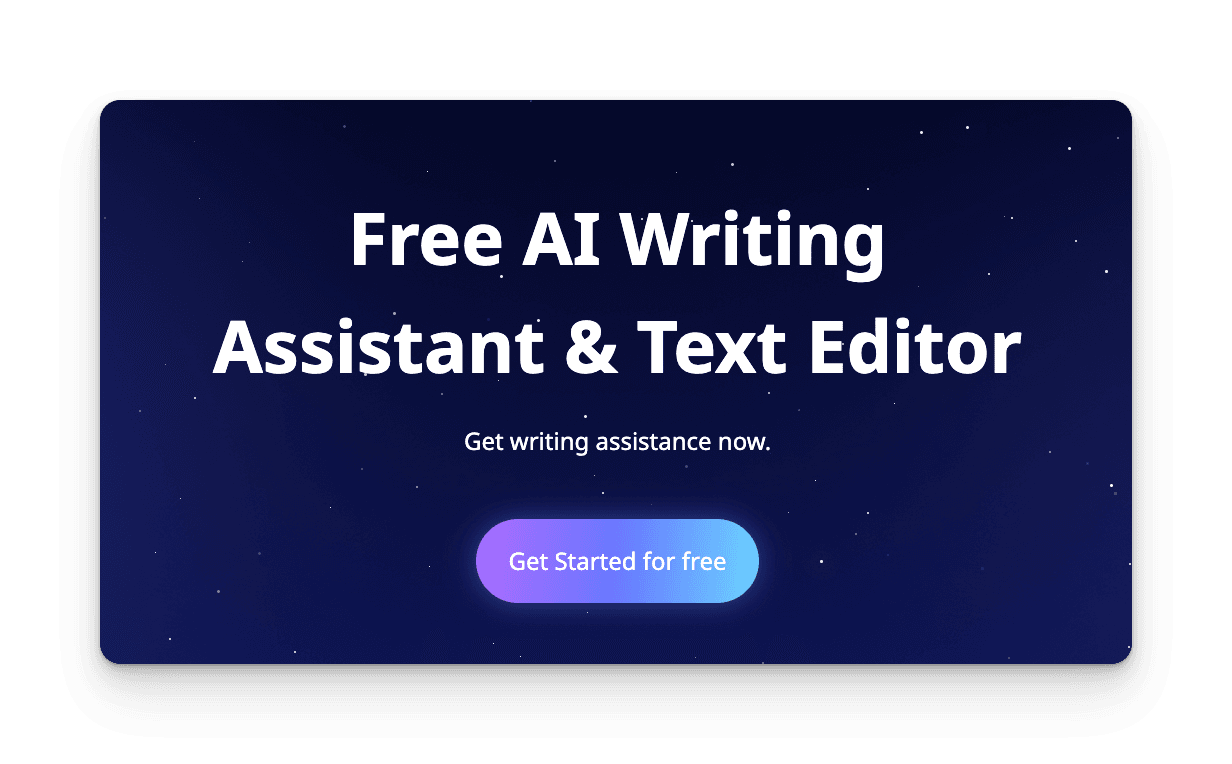
Wordvice AI is an innovative, AI-powered writing assistant that builds upon the expertise of its parent company, Wordvice, a respected provider of editorial services since 2013. By leveraging machine learning and natural language processing, Wordvice AI aims to democratize high-quality editing and make it accessible to students, researchers, and professionals alike.
The tone and formality detection tool ensures that the writing aligns with the intended audience's expectations, while the clarity and conciseness enhancements help users communicate their ideas more effectively.
Pros:
Real-time writing suggestions for immediate feedback and error correction
Tone and formality detection to ensure appropriate language for various contexts
Clarity and conciseness enhancements for streamlined, effective communication
Vocabulary improvement suggestions to enrich writing and avoid repetition
Academic and professional writing support, including citation formatting and style guide adherence
Plagiarism detection feature to flag potential overlap with online sources
Cons:
The plagiarism detection feature is still in development and may not be as comprehensive as a standalone tool
Pricing: $9.95/month
8. Zotero
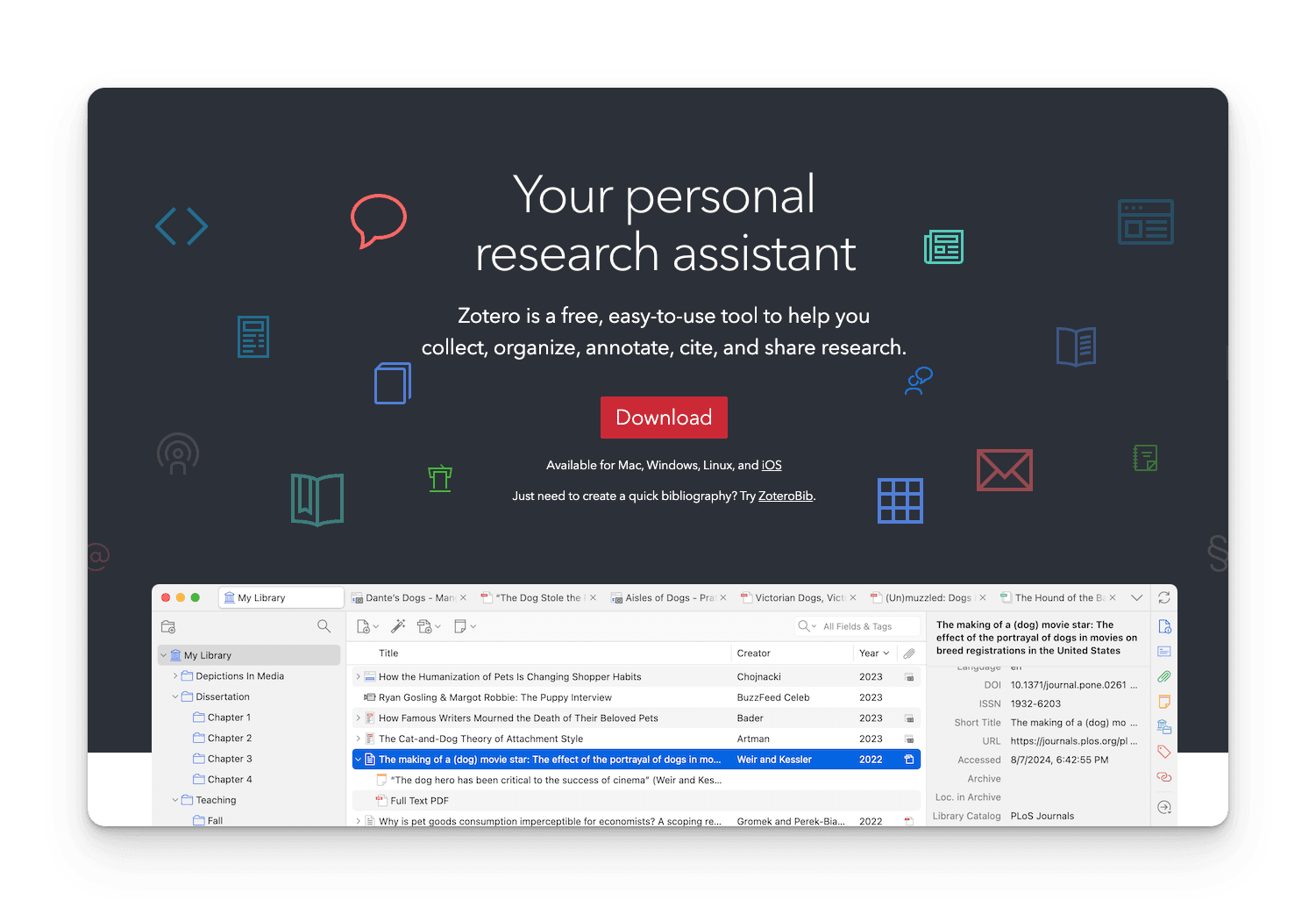
Zotero is a powerful, user-friendly software that streamlines the process of collecting, organizing, and citing research sources. It functions as a digital research assistant, making it an invaluable tool for students, researchers, and writers alike.
Additionally, installing Zotero is very easy, with options for a standalone desktop application or browser extensions for Chrome, Safari, and Firefox. The setup process is intuitive, and users can create a free account to sync their research library across multiple devices and access it online. Zotero offers 300MB of free file storage, with additional storage available for purchase.
Pros:
Automatically captures and saves source information from web pages
Allows users to manually add references and attach files (e.g., PDFs)
Organizes sources using collections (similar to playlists) and tags
Supports collaboration through group libraries
Offers a mobile website and third-party apps for on-the-go access
Cons:
Lacks built-in PDF annotation tools, requiring users to annotate files externally before adding them to the library
Collections are not transferable between Zotero libraries
Pricing: Custom Pricing
9. Jenni AI
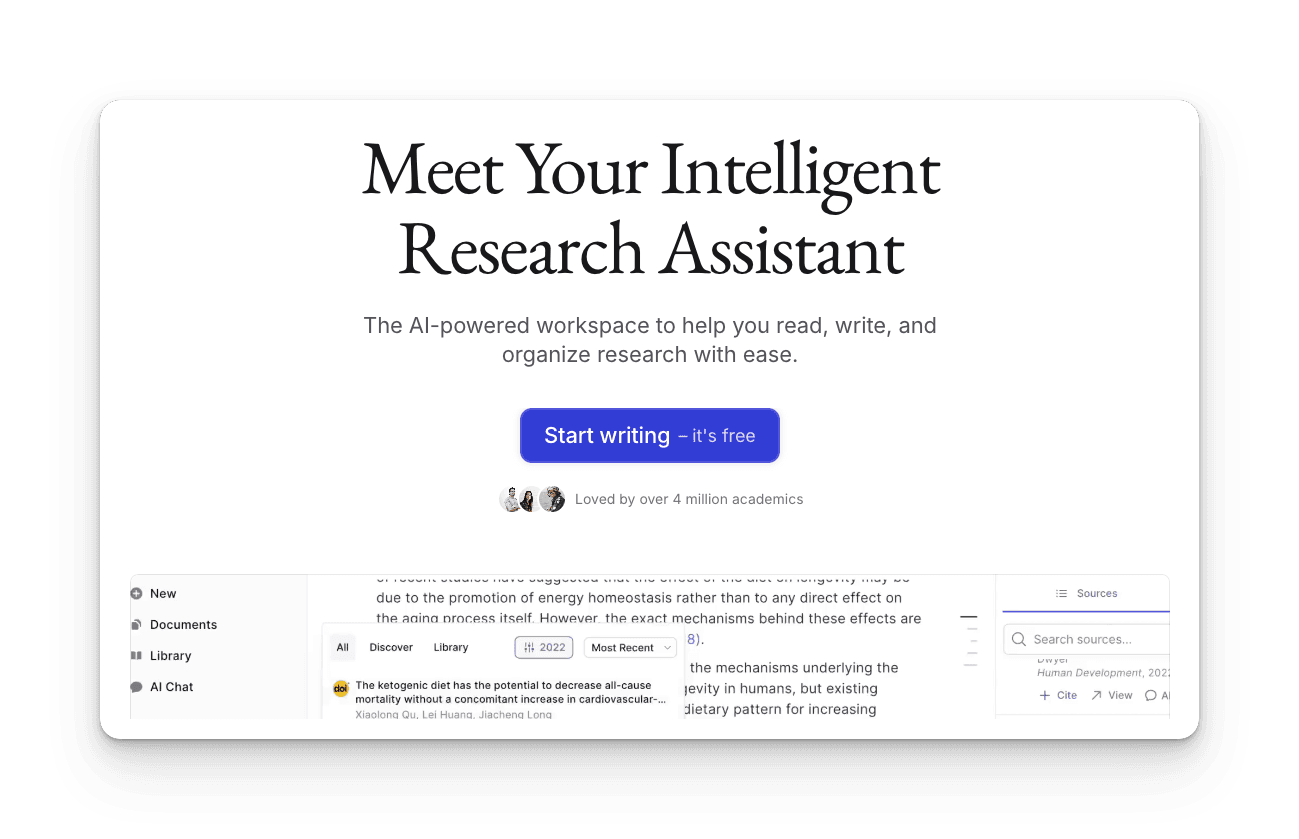
Jenni AI is an artificial intelligence-powered writing assistant that aims to help users create high-quality content more efficiently. While it positions itself as a tool for academics and researchers, Jenni AI's true focus seems to be a bit unclear, with its marketing messaging varying across different platforms. Academics or researchers with specific needs can find value in Jenni AI's specialized features.
Pros:
May help overcome writer's block by suggesting sentence completions
Offers some customization options for content generation
Could potentially be useful for certain academic writing tasks
Cons:
Frequently misunderstands or disregards writing prompts
Output quality is inconsistent and often off-topic
Expensive compared to alternatives like ChatGPT
Pricing: $12/month
10. Jotlify
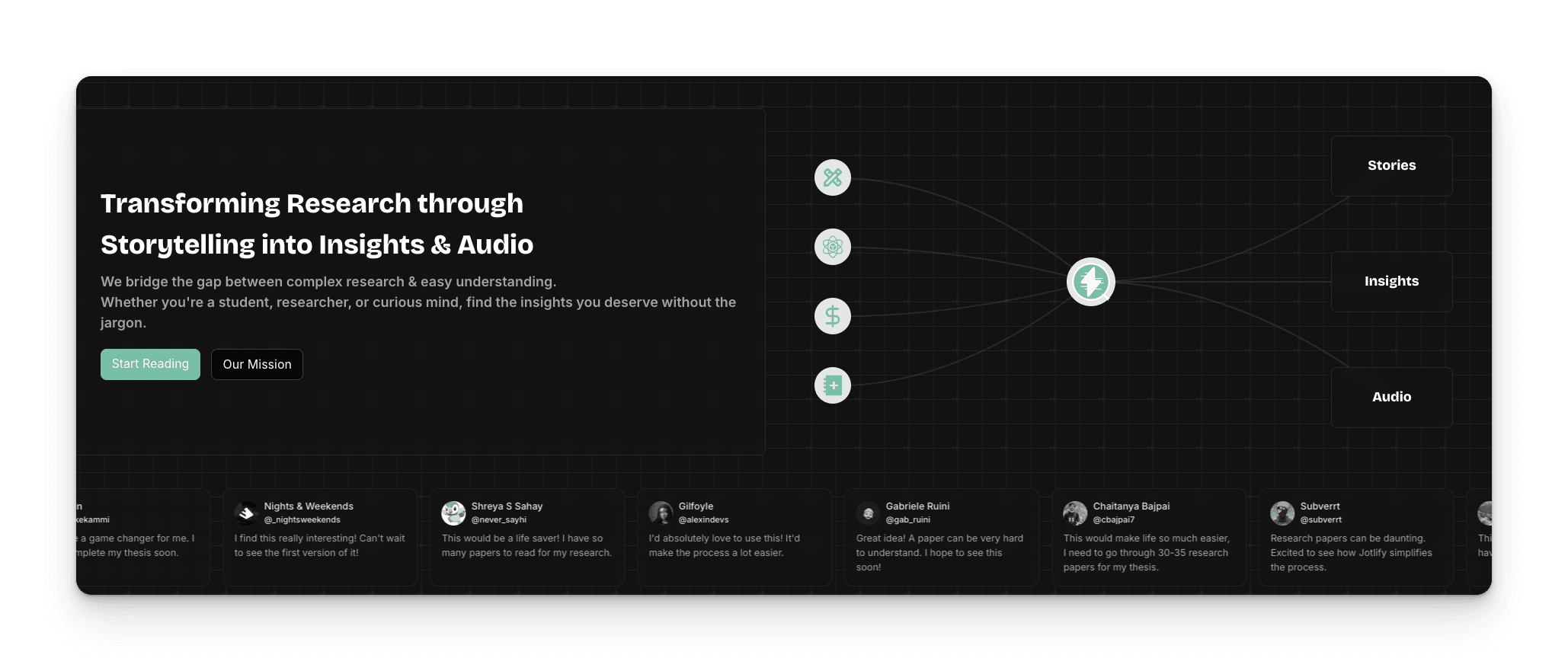
Jotlify is an innovative platform that can make complex research papers into easy-to-digest stories, insights, and audio summaries. Whether you're a student, researcher, or simply someone with a curious mind, Jotlify enables you to access the knowledge you seek without getting lost in technical jargon or complicated formats.
By creating a personalized feed of research papers customized to your interests, Jotlify streamlines the discovery process. For each paper, it provides a concise summary highlighting the key findings and an audio version that allows you to listen to the content on the go. You can even upload your own papers and let Jotlify's AI generate insightful summaries and audio files for you.
Pros:
Makes research papers more accessible and easier to understand
Provides concise written summaries and convenient audio versions
Allows users to upload their own papers for AI analysis
Offers a personalized feed of papers based on interests
Simplifies collaboration by enabling users to share insights
Cons:
Currently limits uploads to three papers per month
May not cover all niche topics or research fields yet
The audio quality of the AI narration should be improved
Pricing: $12/month
Conclusion
In 2026, having the right AI tool can transform scientific writing workflows, boost research abilities, improve content quality, and help researchers deliver well-written, accurate papers.
Among the top 10 tools, Elephas stands out as the ultimate AI-powered research and writing assistant for scientists. Its powerful Super Brain feature, secure offline functionality, and comprehensive knowledge management system make it a standout choice for those focused on efficient and thorough research.
That said, researchers have diverse needs across different aspects of scientific work.
If Elephas's Mac-only platform doesn't meet your needs, alternatives like Consensus for research insights, Claude for writing assistance, or Zotero for organizing references offer excellent features tailored to specific research tasks.
Why not explore these tools today? The ideal AI partner to revolutionize your scientific writing productivity is just a click away.
FAQs
1. How can AI tools help improve my scientific writing process?
AI tools can assist by organizing research materials, suggesting clearer phrasing, ensuring proper citation formatting, checking grammar, and helping maintain consistent technical terminology throughout your papers.
2. Do I need multiple AI tools for different aspects of scientific writing?
Most researchers benefit from using 2-3 complementary tools - typically one for writing assistance, one for reference management, and one for research discovery.
3. Are AI-generated scientific writing suggestions reliable?
While AI tools provide helpful suggestions, all content should be reviewed by human experts to ensure accuracy, proper context, and compliance with field-specific guidelines and standards.
4. How long does it take to learn to use AI writing tools effectively?
Most AI writing tools have intuitive interfaces that can be learned within 1-2 weeks of regular use. The learning curve varies based on the tool's complexity and your technical comfort level.

Comments
Your comment has been submitted